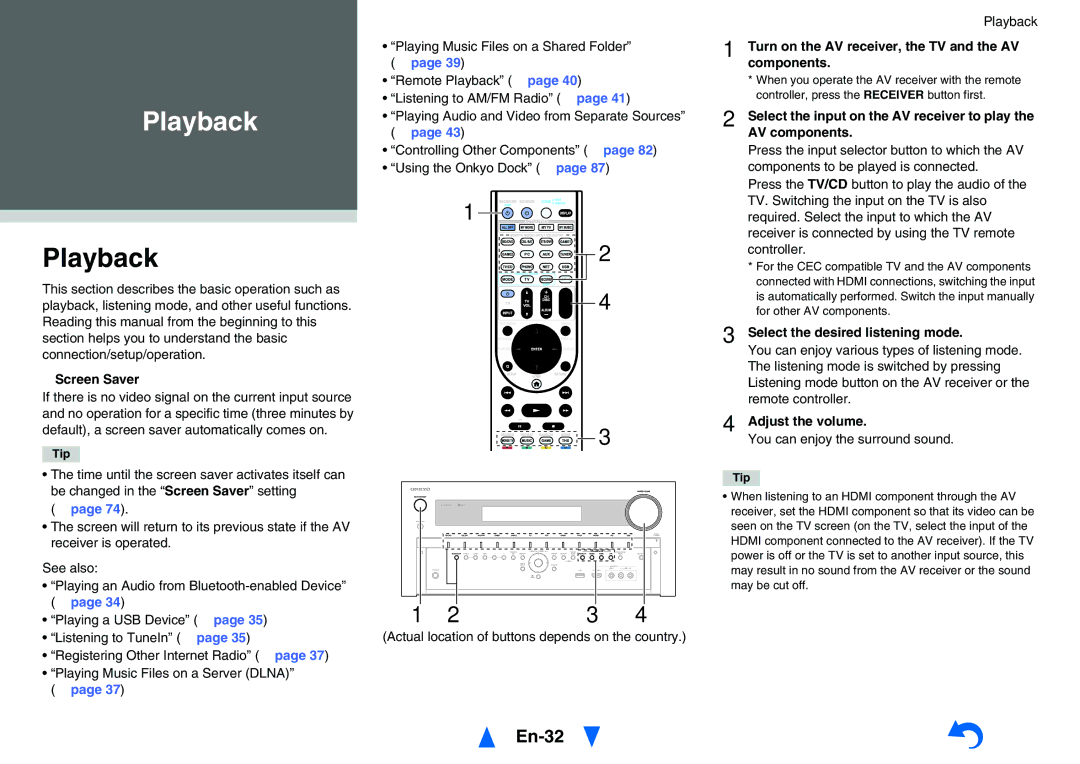
Playback
Playback
This section describes the basic operation such as playback, listening mode, and other useful functions. Reading this manual from the beginning to this section helps you to understand the basic connection/setup/operation.
■Screen Saver
If there is no video signal on the current input source and no operation for a specific time (three minutes by default), a screen saver automatically comes on.
Tip
•The time until the screen saver activates itself can be changed in the “Screen Saver” setting
(➔ page 74).
•The screen will return to its previous state if the AV receiver is operated.
See also:
•“Playing an Audio from
•“Playing a USB Device” (➔ page 35)
•“Listening to TuneIn” (➔ page 35)
•“Registering Other Internet Radio” (➔ page 37)
•“Playing Music Files on a Server (DLNA)” (➔ page 37)
•“Playing Music Files on a Shared Folder” (➔ page 39)
•“Remote Playback” (➔ page 40)
•“Listening to AM/FM Radio” (➔ page 41)
•“Playing Audio and Video from Separate Sources” (➔ page 43)
•“Controlling Other Components” (➔ page 82)
•“Using the Onkyo Dock” (➔ page 87)
1 ![]()
![]()
![]()
![]()
![]()
![]()
![]()
![]()
![]()
![]()
![]()
![]()
![]()
![]() 2
2
![]()
![]() 4
4
![]() 3
3
1 | 2 | 3 | 4 |
(Actual location of buttons depends on the country.)
En-32
Playback
1 Turn on the AV receiver, the TV and the AV components.
*When you operate the AV receiver with the remote controller, press the RECEIVER button first.
2 Select the input on the AV receiver to play the AV components.
Press the input selector button to which the AV components to be played is connected.
Press the TV/CD button to play the audio of the TV. Switching the input on the TV is also required. Select the input to which the AV receiver is connected by using the TV remote controller.
*For the CEC compatible TV and the AV components connected with HDMI connections, switching the input is automatically performed. Switch the input manually for other AV components.
3 Select the desired listening mode.
You can enjoy various types of listening mode. The listening mode is switched by pressing Listening mode button on the AV receiver or the remote controller.
4 Adjust the volume.
You can enjoy the surround sound.
Tip
•When listening to an HDMI component through the AV receiver, set the HDMI component so that its video can be seen on the TV screen (on the TV, select the input of the HDMI component connected to the AV receiver). If the TV power is off or the TV is set to another input source, this may result in no sound from the AV receiver or the sound may be cut off.
